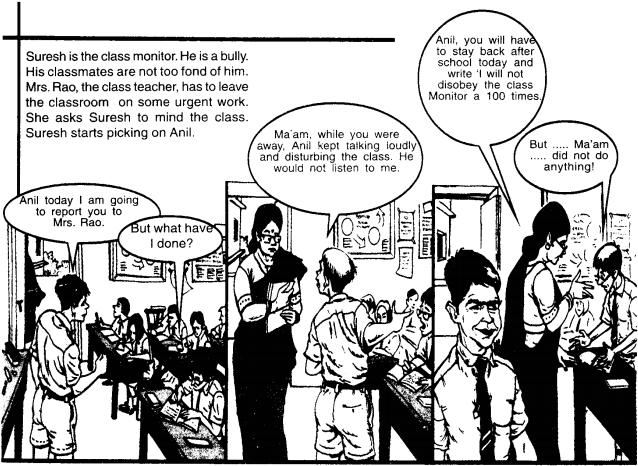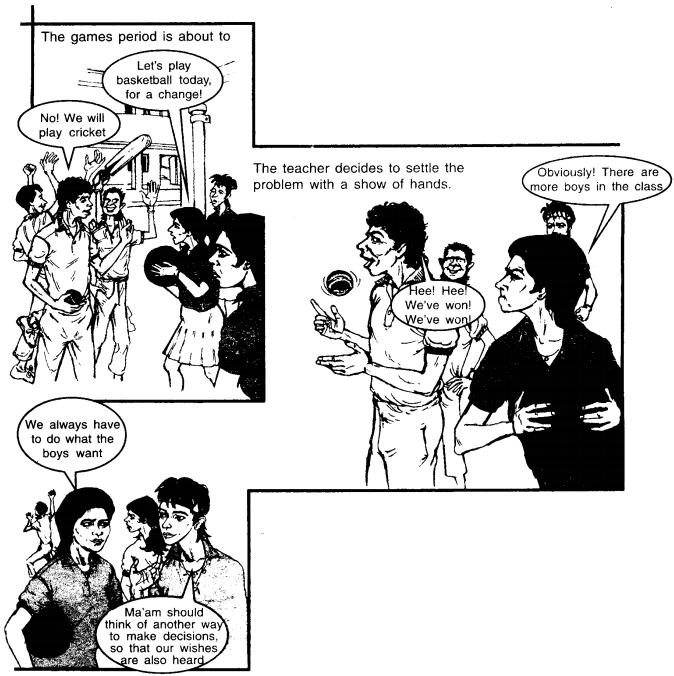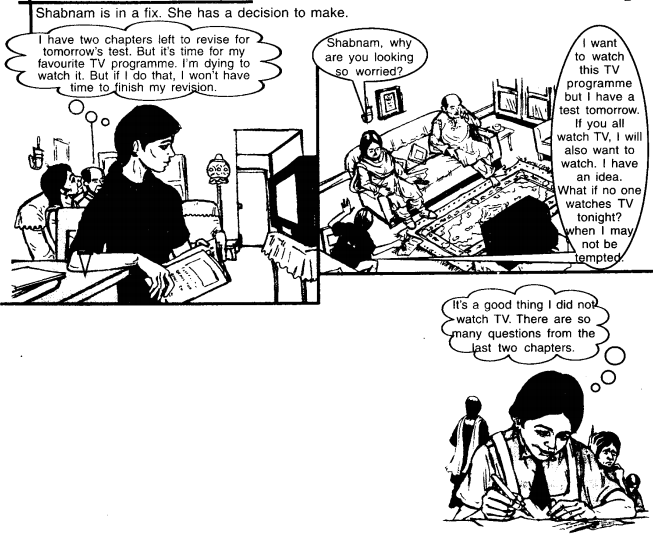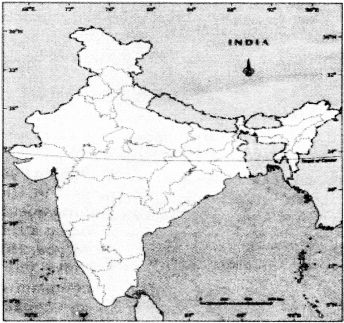The Indian Constitution Class 8 Questions and Answers Civics Chapter 1
Civics Class 8 Chapter 1 NCERT Textbook Questions and Answers
Question 1.
Discuss with your teacher what you, understand by the term constitutive. Provide one example of constitutive rules from your everyday life.
Answer:
The term ‘Constitutive’ means fundamental. For example in the game of hockey, a player should not touch the ball with his hand. This is a constitutive rule of the game of hockey.
Question 2.
Why do the people of Nepal want a new constitution?
Answer:
Nepal was ruled by a king. The people of the country are moving from a monarchy to a democratic government. In order to be a democratic country Nepal needs a new constitution.
Read the following story board and answer the following questions :

Question 3.
In what way is the class monitor misusing his power?
Answer:
The class monitor is misusing his power by making false complaint about Anil to the class teacher. Anil is innocent, but the class monitor is convincing the teacher that he was talking loudly during absence. The teacher is annoyed and punishes Anil.
Question 4.
In which of the following situations is a minister misusing his power.
(a) refuses to sanction a project of his ministry for sound technical reasons.
(b) threatens to send his security staff to rough up his neighbour.
(c) calls up the police station asking them not to register complaint that is likely to be filed against the relative.
Answer:
The minister misuses his power in the following situation :
(a) Threatens to send his security staff to rough up his neighbour.
(b) Calls up the police station asking them not to register a complaint that is likely to be filed against his relative.
Read the following story board and answer the following questions :

Question 5.
Who is in a minority in the above story board? In what way is this minority being dominated by the decision taken by the majority?
Answer:
The girls are in minority. The majority imposed its will on the minority. At last the girls do what the boys want.
Read the following story board and answer the following questions.

Question 6.
Why was Shabnam happy she had not watched TV? What would you have done in a semester situation?
Answer:
Shabnam spend most of her time revising two chapters for the test instead of watching TV. For this reason, She did excellent in the test. She could answer all the questions and thus, was very happy.
I would have done the same thing what Shabnam did.
Question 7.
Discuss the difference between state and government with your teacher.
Answer:
The government is the main body for administrating and enforcing laws. It can also change with elections. On the other hand, state refers to a political institution that represent a definite territory.
Question 8.
Which Fundamental Rights will the following situation violate :
– If a 13 year child is working in a factory manufacturing carpets.
– If a politician in one state decides not to allow labourers from other states to work in his state.
– If a group of people are not given permission to open a Telugu medium school in Kerala.
– If the government decides not to promote an officer of the armed forces because she is a women.
Answer:
(a) Right against Exploitation
(b) Right to Freedom
(c) Cultural and Educational Right
(d) Right to Equality.
Question 9.
Why does a democratic country need a constitution?
Answer:
A democratic country means a government formed by the people; the leaders choosen by the people. The leaders exercise powers on our behalf. Sometimes the leaders may misuse their powers. Thus, a constitution is needed to stop this misuse of power. The constitution safeguards against this misuse.
Question 10.
Look at the wordings of the two documents given below. The first column is from the 1990 Nepal constitution. The second column is from the more recent Interim Constitution of Nepal.
| 1990 Constitution of Nepal Part-7 Executive | 2007 Interim Constitution Part- 5 : Executive |
| Article-35 : Executive Power: The executive power of the kingdoms of Nepal shall be exercised exclusively by his Majesty. | 1. The executive power of Nepal shall, pursuant in this constitution and other laws be vested in the council of ministers. 2. The executive functions of Nepal shall be taken in the name of the Prime Minister. |
What is the difference in who exercises ‘Executive Power’ in the above two constitutions of Nepal. Keeping this in mind, why do you think Nepal needs a new Constitution today?
Answer:
In the constitution of Nepal, in 1990, the king exercised the executive power, however, in 2007, Interim Constitution of Nepal the Prime Minister, leader of the representatives of the people, exercise the executives power.
Question 11.
What would happen if there were no restrictions on the power of elected representatives?
Answer:
They would do whatever they wanted, misuse their power which would lead to anarchy.
Question 12.
In each of the following situations, identify the minority. Write one reason why you think it is important to respect the views of the minority in each of these situations.
(a) In a school with 30 teachers, 20 of them are male.
(b) In a city, 5 per cent of the population are Buddhists.
(c) In a factory mess for all employers, 80 per cent are vegetarians.
(d) In a class of 50 students, 40 belong to more well off families.
Answer:
(a) The female teachers are in minority. It is important to respect their views because they are also a part of the school and contribute to the standard of teaching of the school.
(b) The Buddhists are in minority. They should also be given equal rights and they are also citizens of our country.
(c) The non-vegetarians are in minority. Their views should also be respected because they are also human beings.
(d) The 10 per cent of the class are from poor or middle class families. Their views must also be respected as they are also equal and part of the class.
Question 13.
The column on the left lists some of the key features of the Indian Constitution. In the other column write two sentences, in your own words, on why you think their feature is important.
| Key Feature | Significance |
| Federalism Separation of powers Fundamental Rights Parliamentary form of Government |
Answer:
| Key Feature | Significance |
| Federalism | By means of federalism a vast country can be managed. Distribution of power helps in the progress of a country. |
| Separation of powers | The three organs of the government, the legislature, excutive and judiciary, exercise different powers. For this reason, each organ acts as a check on the other organs. This help in the balance of power between them. |
| Fundamental Rights | Fundamental Rights Fundamental Rights protect the people from the absolute powers of the state. These rights help a person to live freely in our country. |
| Parliamentary form of Government | By this people can elect their representatives. Every citizen of the country can contest in elections. |
Question 14.
Colour in the following countries in this map :
(a) Colour India in red
(b) Colour Nepal in green
(c) Colour Bangladesh in yellow.
